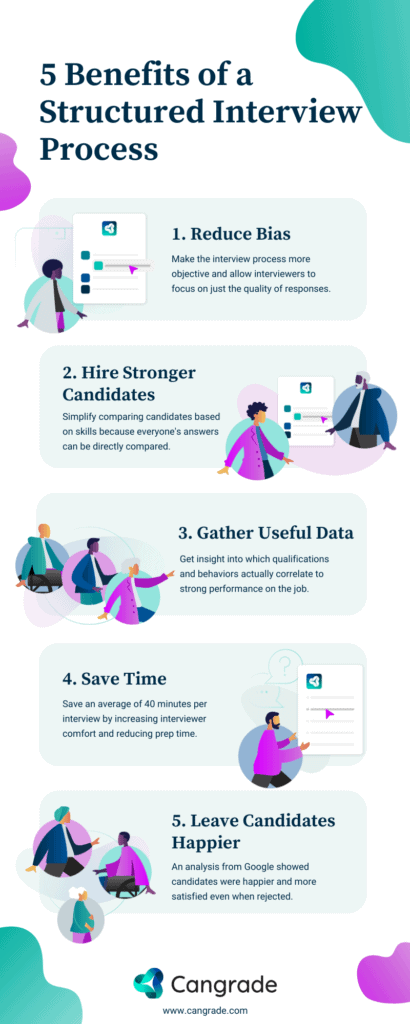6 Benefits of a Structured Interview Process
Unstructured, conversational interviews are very popular during the hiring process at most companies. Both the interviewers and candidates feel comfortable, the conversation flows easily, and a bond often forms over a shared interest or experience. But while these unstructured interviews are popular, they’re actually not an effective way to hire the best candidates.
A structured interview process, where candidates are all asked the same questions in the same order, has significant benefits for hiring managers and companies as a whole.
1. Reducing Bias
People prefer to hire candidates who look and sound like themselves – even people who are strongly committed to diversity and inclusion. Unstructured interviews allow personal bias to creep into the questions asked and the analysis of responses as well. In fact, men and women are likely to be asked different questions during the hiring process using unstructured interviews. Structured interviews reduce biases, such as expecting women to perform better at stereotypically female jobs, and allow interviewers and hiring managers to focus on just the quality of responses.
2. Hiring Stronger Candidates
When a candidate and an interviewer have a strong personal connection – a shared hometown, favorite sports team, or similar background – this typically leads to affinity bias, or the tendency to prefer people similar to yourself. And that means candidates are brought on board based on connection, not qualifications. In a structured interview process, it’s easier to compare candidates based on skills because everyone is asked the same questions and their answers can be directly compared. The strongest candidates will emerge, instead of the ones most similar to the hiring manager.
3. Gathering Useful Data
Predicting which candidates will excel in an open role can seem like a guessing game when conducting an unstructured interview. The process varies so widely that it’s difficult to draw evidence-based conclusions. But structured interviews can provide insight into which qualifications and behaviors actually correlate to strong performance on the job in a particular role. For example, looking closely at how candidates who were eventually hired answered certain questions and their success in the role once they began can help determine which questions are essential to ask in interviews, and which ones don’t have much bearing on real-world success.
4. Saving Time
Google uses a structured interview process in their hiring, and they’ve conducted extensive research on the results. One of the major benefits they found was an average time savings of 40 minutes per interview. Their interviewers feel more prepared because they’re provided with guides and rubrics as a basis for their assessments. And since the questions asked are the same each time, interviewers spend less time preparing for the interview as well.
5. Happier Candidates
Another finding from Google’s analysis is that candidates were happier and more satisfied with structured interviews. This applied even to candidates who were ultimately rejected as applicants because the process felt fairer, with questions based more on competency than personality. And since 87 percent of professionals say a positive interview experience can change their mind about a role or company they once doubted, providing an interview experience that feels fair and unbiased is vital.
6. Increasing Diversity
More and more companies are committing to interviewing a diverse group of candidates, but that doesn’t always lead to an increase in diverse hires because of unconscious bias. A structured interview process reduces the disparity in questions asked and makes the interview process more objective, leading to less biased hiring and a more diverse team.
Looking to use the power of structured interviews in your hiring process? Our Structured Interview Guides can help.
Download the infographic with these insights below.
